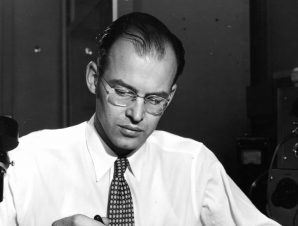Robert N. Hall, 96, Whose Inventions Are Everywhere, Is Dead
Product Information

After the war, Dr. Hall returned to Caltech for a doctorate. With the encouragement of his advisers, who were excited by the atomic age, he began studying nuclear physics. He received his Ph.D. in 1948.
Dr. Hall would never enter the field professionally. But though he never did nuclear research, a classmate did, and it was through him that Dr. Hall learned that nuclear physicists were bedeviled by a problem with the germanium used in devices that detected the gamma rays given off by radioactive activity — rays that are deadly at high exposures.
Dr. Hall reasoned that he could solve the problem by purifying germanium to the point where no more than one-millionth of a millionth part would be impure — an unheard-of level. Few believed that that was possible, but Dr. Hall succeeded, creating the detector that is used worldwide today.
Dr. Hall held more than 40 patents in the United States. He was awarded the Marconi Prize in 1989 and was inducted into the National Inventors Hall of Fame in 1994. He retired from the G.E. lab in 1987.
Robert Noel Hall was born on Dec. 25, 1919, in New Haven, the youngest of two sons of Harry and Clara (Kommers) Hall. (They gave him the middle name Noel because he was born on Christmas Day.) Harry Hall was a horticulturalist who took odd jobs to support his family during the Depression.
Besides his daughter, Dr. Hall is survived by a son, Richard. His wife of more than 70 years, Dora, died in 2013. His brother, Sydney, died last year.
Dr. Hall said he became interested in science as an 11-year-old when an uncle, Sydney Hall, an early aircraft-engine designer, took him to a science fair.
In a 2012 interview for this obituary, he talked about the pleasure he took in a life of science. “You see there is a problem to be solved,” he said, “and you think about it, and you solve it, and it’s a thrill.”
Source: Werzit – Local – Space – Cyber


Recent Comments